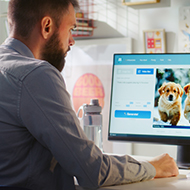
Investigation reveals a high prevalence of unscrupulous sellers.
Leading animal charities are urging social media companies to do more to protect animal welfare by closing the loopholes that enable pet trading on their platforms.
The call from Dogs Trust and Cats Protection follows research by the Pet Advertising Advisory Group (PAAG), which found that 19 per cent of all social media adverts are potential scams. These scams include coercing buyers into paying deposits for non-existent pets and sellers lying about the health of animals.
Furthermore, the investigation revealed that 94 per cent of social media adverts for pets for sale went against PAAG's advertising standards. Eighty per cent of adverts for young animals did not include an image of the pet with its mother, suggesting the animal may have been prematurely separated and illegally smuggled into the country.
Established to tackle the irresponsible advertising of pets, PAAG includes Dogs Trust, Cats Protection and other animal welfare organisations, trade associations and veterinary bodies.
Unlike classified sites such as Preloved, Gumtree, and Pets4Homes, which have agreed to the Advertising Standards set out by PAAG, social media platforms make their own rules on pet sales with little oversight.
In light of their findings, PAAG has written to Facebook, Instagram and TikTok, calling for them to ban posts or adverts that encourage people to buy through their platforms. The collective is also urging animal lovers to exercise caution if buying a new pet this Christmas, especially through social media.
Claire Wilson-Leary, public affairs manager at Dogs Trust, acknowledged that while the charity would always encourage pet adoption, it is aware that people often want a particular pet or breed.
She said: “We want to encourage people to ensure that they fully consider the lifelong commitment that comes with owning a pet, and to find a reputable breeder or rehoming centre, and not buy a pet for sale on social media".
Stefan Blakiston Moore, advocacy and campaigns manager at Cats Protection, stressed the role of social media in the cat trade is a "significant concern", adding:
“Cats Protection’s Cats and Their Stats Report 2024 has found that Facebook is the top individual source being used to find a cat to buy. Buying a pet is a uniquely emotional purchase – buyers are not just picking a new item for their house; they are investing in a family member, making them vulnerable to scammers and unscrupulous sellers - both of which appear to be extremely prevalent on social media".
The PAAG investigation took place between 20 May and 3 June 2024, during which 507 social media adverts, groups and pages were reviewed by over 40 volunteers.
Image (C) Shutterstock.



 The Veterinary Medicines Directorate (VMD) is inviting applications from veterinary students to attend a one-week extramural studies (EMS) placement in July 2026.
The Veterinary Medicines Directorate (VMD) is inviting applications from veterinary students to attend a one-week extramural studies (EMS) placement in July 2026.